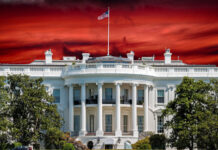
In a move that has ignited fervent debate across the nation, CNN recently promoted an Easter message from theologian Christina Cleveland, who controversially claims "God is a black woman." This bold assertion, coupled with President Joe Biden's recent actions surrounding Easter, has intensified discussions on the intersection of religion, race, and politics, particularly among conservative circles.
On March 31st, 2024, The Gateway Pundit reported on CNN's decision to feature Cleveland's unconventional Easter message. According to the report, Cleveland's portrayal of Jesus and his disciples as people of color challenges traditional images prevalent in evangelical Christianity. This reimagining of biblical figures aims to foster a more inclusive understanding of Christianity, reflecting the diversity of its followers worldwide.
It’s insane that CNN is choosing to run this as their main Easter story. Obsessing over the skin color of Jesus completely misses the point of his message, and tries to turn him into an object of political contention. It’s sad, and incredibly inappropriate for Easter. pic.twitter.com/W1CmM104tG
— Griffin Fill (@GriffinFill) March 31, 2024
However, this perspective has not been universally welcomed. Many conservatives view CNN's promotion of Cleveland's message as blasphemous, arguing it distorts Christian doctrine for political ends. Critics accuse the network of undermining the sanctity of Easter, a central celebration of Christian faith, by injecting contemporary racial and political issues into its observance.
Adding fuel to the fire, President Joe Biden's recent proclamations have further alienated conservative Christians. The declaration of 'Transgender Visibility Day' on Easter Sunday, alongside the exclusion of Christian-themed designs from the White House's Easter art contest, has been perceived as a direct affront to Christian values. These actions have led to accusations of a broader war on Christians by the Biden administration, intensifying the sense of cultural and religious siege felt by many conservatives.
CNN’s choice of words falls short yet again: The victims were Christians, not just ‘Easter worshipers’. It’s a disservice to their memory and identity to not acknowledge their faith accurately. pic.twitter.com/zYnjHPttuW
— Clown World ™ 🤡 (@ClownWorld_) March 29, 2024
Cristina Laila of The Gateway Pundit encapsulates the conservative response to these developments, highlighting the perceived clash between religious beliefs and the emerging progressive views championed by entities like CNN and the Biden administration. The controversy underscores ongoing debates over the representation of religious figures, the inclusivity of faith communities, and the role of traditional beliefs in an increasingly diverse society.
The backlash from conservative quarters is not merely about the specifics of Cleveland's theological claims or Biden's political gestures. It reflects deeper anxieties about the erosion of religious freedoms and the sanctity of Christian traditions in the face of progressive ideologies. Many fear that such controversies signal a shift away from foundational Judeo-Christian values towards a secular, relativistic worldview that marginalizes traditional faith perspectives.
As the nation grapples with these contentious issues, the need for respectful dialogue and mutual understanding has never been greater. While progressives advocate for inclusivity and representation, conservatives call for the preservation of religious traditions and beliefs. Bridging this divide requires acknowledging the deeply held convictions on both sides and striving for solutions that honor the diversity of American religious life.
In conclusion, the controversy surrounding CNN's Easter message and the Biden administration's recent actions highlights the complex interplay of religion, race, and politics in contemporary America. As the country moves forward, finding common ground amidst these divergent views will be crucial in fostering a cohesive and respectful societal fabric.













